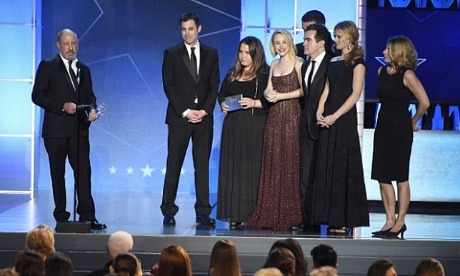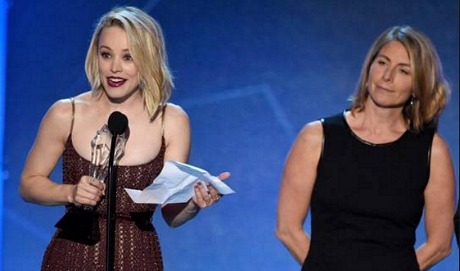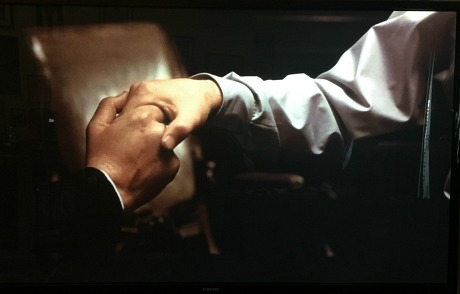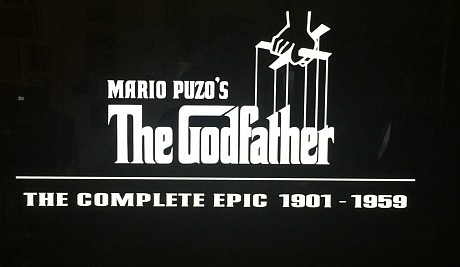Don’t kid yourself — Spotlight‘s ass was saved tonight when it won the Critics Choice award for Best Picture, Best Original Screenplay and Best Ensemble.
That gut-punch feeling after The Revenant surged the weekend before last (winning the Golden Globe for Best Motion Picture, Drama plus earning a better than expected $39 million when Alejandro G. Inarritu‘s film went wide) was alleviated or medicated away tonight. Not to mention last Thursday’s gulpy feeling after The Revenant landed 12 Oscar nominations compared to Spotlight‘s 6 (Best Picture, Best Directing, Best Supporting Actor, Best Supporting Actress, Best Film Editing, Best Original Screenplay)…temporarily forgotten.
As Tennessee Williams once wrote, “Sometimes there’s God so quickly!”
 Spotlight
Spotlight producer Steve Golin (l.) and the supporting team (r.).
 Spotlight
Spotlight Best Supporting Actress nominee Rachel McAdams,
Boston Globe reporter Sacha Pfeiffer accepting the Best Ensemble Award.
The cynical, know-it-all blogaroonies will try to dismiss or minimize the significance of tonight’s Spotlight comeback, and I won’t argue that the real test of the situation will come when the Producers Guild hands out its Daryl F. Zanuck award on Saturday, 1.23.
If Spotlight takes the top PGA prize, champagne time. If The Big Short takes it, confusion and craziness. If The Revenant wins, back to that feeling of despair and defeatism for the Spotlight-ers. And if Mad Max: Fury Road pulls it out of the hat, whoopee for George Miller along with an even crazier sense of lettuce leaves being tossed in the air and landing every which way.
I’m only telling you that the Spotlight team (Rachel McAdams, Sacha Pfeiffer, producer Steve Golin, Open Road’s Tom Ortenberg but minus Michael Keaton, Mark Ruffalo, Liev Schreiber and director Tom McCarthy) breathed a collective sigh of relief when they won the Best Picture trophy. The Critics Choice awards have proven a better statistical predictor of the Oscars than the Globes, and there’s nothing the cynics can say that will alter that.
Cue Elton John‘s “Someone Saved My Life Tonight.”
Read more








